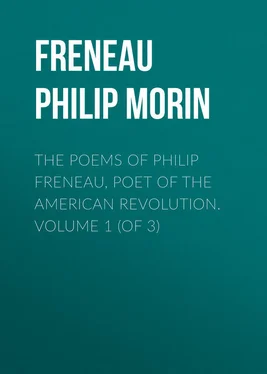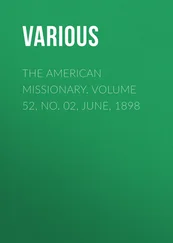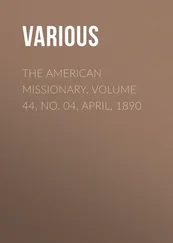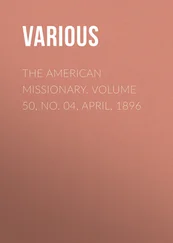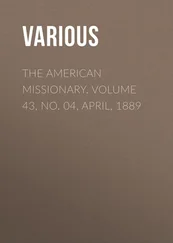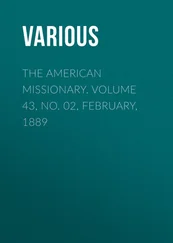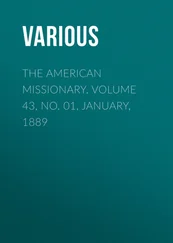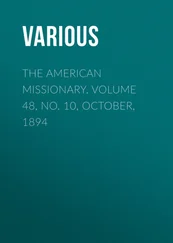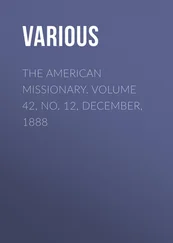Philip Freneau - The Poems of Philip Freneau, Poet of the American Revolution. Volume 1 (of 3)
Здесь есть возможность читать онлайн «Philip Freneau - The Poems of Philip Freneau, Poet of the American Revolution. Volume 1 (of 3)» — ознакомительный отрывок электронной книги совершенно бесплатно, а после прочтения отрывка купить полную версию. В некоторых случаях можно слушать аудио, скачать через торрент в формате fb2 и присутствует краткое содержание. Жанр: Поэзия, foreign_antique, foreign_prose, foreign_poetry, на английском языке. Описание произведения, (предисловие) а так же отзывы посетителей доступны на портале библиотеки ЛибКат.
- Название:The Poems of Philip Freneau, Poet of the American Revolution. Volume 1 (of 3)
- Автор:
- Жанр:
- Год:неизвестен
- ISBN:нет данных
- Рейтинг книги:4 / 5. Голосов: 1
-
Избранное:Добавить в избранное
- Отзывы:
-
Ваша оценка:
- 80
- 1
- 2
- 3
- 4
- 5
The Poems of Philip Freneau, Poet of the American Revolution. Volume 1 (of 3): краткое содержание, описание и аннотация
Предлагаем к чтению аннотацию, описание, краткое содержание или предисловие (зависит от того, что написал сам автор книги «The Poems of Philip Freneau, Poet of the American Revolution. Volume 1 (of 3)»). Если вы не нашли необходимую информацию о книге — напишите в комментариях, мы постараемся отыскать её.
The Poems of Philip Freneau, Poet of the American Revolution. Volume 1 (of 3) — читать онлайн ознакомительный отрывок
Ниже представлен текст книги, разбитый по страницам. Система сохранения места последней прочитанной страницы, позволяет с удобством читать онлайн бесплатно книгу «The Poems of Philip Freneau, Poet of the American Revolution. Volume 1 (of 3)», без необходимости каждый раз заново искать на чём Вы остановились. Поставьте закладку, и сможете в любой момент перейти на страницу, на которой закончили чтение.
Интервал:
Закладка:
But if the National Gazette concerned Jefferson not at all, as he alleged, it certainly did exasperate Washington. Later on, when the Genet affair had urged Freneau into still greater excesses, Washington, on the 23d of May, 1793, had a conversation with Jefferson, which the latter recorded in his Ana :
"He [the President] adverted to a piece in Freneau's paper of yesterday, he said he despised all their attacks on him personally, but that there never had been an act of the government, not meaning in the Executive line only, but in any line, which that paper had not abused. He had also marked the word republic thus – where it was applied to the French republic [see the original paper]. He was evidently sore & warm, and I took his intention to be that I should interpose in some way with Freneau; perhaps withdraw his appointment of translating clerk to my office. But I will not do it. His paper has saved our constitution, which was galloping fast into monarchy, & has been checked by no one means so powerfully as by that paper. It is well and universally known, that it has been that paper which has checked the career of the monocrats, & the President, not sensible of the designs of the party, has not with his usual good sense and sang froid , looked on the efforts and effects of this free press and seen that, though some bad things have passed through it to the public, yet the good have preponderated immensely." 13
Washington even brought the affair into a meeting of the Cabinet, declaring, according to Jefferson's Ana , that,
"That rascal, Freneau, sent him three copies of his paper every day as if he thought he (Washington) would become the distributor of them; that he could see in this nothing but an impudent design to insult him; he ended in a high tone." 14
The National Gazette published its last issue, October 23, 1793. The collapse of the Genet bubble – the revulsion of feeling after the Frenchman had threatened to appeal from Washington to the people, brought on a tidal wave which swept away all the idols of French Republicanism in America, and the National Gazette could not withstand the tide. Subscribers withdrew their subscriptions at a ruinous rate, the notes of the proprietors were protested, and the paper was abandoned. Freneau had no idea, however, of final surrender. His last word was a promise which, however, was never fulfilled.
"With the present number concludes the second volume and second year's publication of the National Gazette . Having just imported on his own account a considerable quantity of new and elegant printing types from Europe, it is the editor's intention to resume the publication of this paper in a short time and previous to the meeting of Congress in December next."
It is upon this episode that the reputation of Freneau among the generality of people chiefly rests. "That rascal Freneau" is the epithet that has clung to his name through all the intervening century. It is this one affair, more than anything else, that has kept him from the recognition he deserves, both as a patriot and a poet. The attitude of New England may be expressed in the words of President Dwight, written during the summer of 1793:
"Freneau, your printer, linguist, &c., is regarded here as a mere incendiary, or rather as a despicable tool of bigger incendiaries, and his paper as a public nuisance."
Letters might be multiplied in showing the same spirit in all of the Federalists.
It must not be forgotten, however, that Freneau acted from pure and honest motives; that the excitement and bitter partisanship of the period were extraordinary, and that the air was heavily charged with the subtle magnetism that in France had created a reign of terror. It cannot be denied that Freneau went to excess in his denunciations; but so did Hamilton, who in reality began the conflict; so did Jefferson; so did many others. As to the extent to which Jefferson went in subsidizing the Gazette for his own use, the reader may judge for himself. Neither side is free from blame; Freneau is certainly no more culpable than the others who held far higher positions than he. It is but justice to say of Freneau, in the words of Jefferson's biographer, Randall —
"He was always a warm, and after the period of which we write, became a violent partisan. It is but justice to his memory, however, to say that his honor and his veracity as a man were never questioned by those who knew him, and that his reputation in these particulars is now as free from all taint of suspicion as is that of any of the distinguished gentlemen whose names were associated with his in the controversy."
The following words of Madison, taken from Mr. Trist's memoranda of a conversation, May 25, 1827, and published in Tucker's Life of Jefferson, probably presents the affair in its true light:
"Mr. Madison said: 'Freneau's paper was another cause of soreness in General Washington. Among its different contributors, some were actuated by over-heated zeal, and some, perhaps, by malignity. Every effort was made in Fenno's paper, and by those immediately around him (Washington) to impress on his mind a belief that this paper had been got up by Mr. Jefferson to injure him and oppose the measures of his administration. Freneau himself was an old College mate of mine, a poet and man of literary and refined tastes, knowing nothing of the world. He was a French scholar, and employed at first as translator. Henry Lee, who was also his College mate, and had also a friendly feeling for him, was the more immediate cause of his establishing a paper. Our main object in encouraging it, was to provide an antidote against Fenno's paper, which was devoted to monarchy, and had begun to publish extracts from Mr. Adams's book. I used occasionally to throw in an article, all of which I have marked, and some of which I have shown you, with a view chiefly to counteract the monarchial spirit and partisanship of the British government which characterized Fenno's paper. I never engaged in the party criminations.'"
It deserves mention that Freneau stuck to his post during the yellow fever epidemic of 1793, and that for weeks he was the only active editor in the city. On October 1st he resigned his position as translator, and soon after removed to his old home at Mount Pleasant. For a time he was without employment. He contemplated several newspaper enterprises. He evidently took steps toward the publication of a paper in Monmouth County, New Jersey, as the following advertisement, published in the Jersey Chronicle , May 30, 1795, would show:
"A number of persons in Freehold and other parts of Monmouth subscribed last year to a paper the editor then proposed to set on foot. As various causes delayed him prosecuting his intended purpose until the present spring, and as he supposes, many of them might in the meantime have engaged with other printers, he hopes they will if possible transfer their subscription to the Chronicle ."
On November 2, 1794, he writes Madison, recommending his old friend Bailey for the office of public printer, and on May 6th following, he received a reply:
"I delayed acknowledging your favour long ago received, until I could inform you of the prospects of Mr. Bailey in whose favor it was written. I have now the pleasure to tell you that although his wishes are not to be immediately fulfilled he is looking to obtain under the auspices of Mr. Beckley and Mr. Randolph a share of employment hereafter which may be very valuable to him. I congratulate you on the public intelligence just received from Holland which gives joy to all true Republicans, and wish you all the private happiness which an exchange of your former travelled scenes for the shade and tranquility of your present life can afford. Remember, however, as you have not chosen any longer to labor in the field of politics it will be expected by your friends that you cultivate with the more industry your inheritance on Parnassus."
Читать дальшеИнтервал:
Закладка:
Похожие книги на «The Poems of Philip Freneau, Poet of the American Revolution. Volume 1 (of 3)»
Представляем Вашему вниманию похожие книги на «The Poems of Philip Freneau, Poet of the American Revolution. Volume 1 (of 3)» списком для выбора. Мы отобрали схожую по названию и смыслу литературу в надежде предоставить читателям больше вариантов отыскать новые, интересные, ещё непрочитанные произведения.
Обсуждение, отзывы о книге «The Poems of Philip Freneau, Poet of the American Revolution. Volume 1 (of 3)» и просто собственные мнения читателей. Оставьте ваши комментарии, напишите, что Вы думаете о произведении, его смысле или главных героях. Укажите что конкретно понравилось, а что нет, и почему Вы так считаете.
